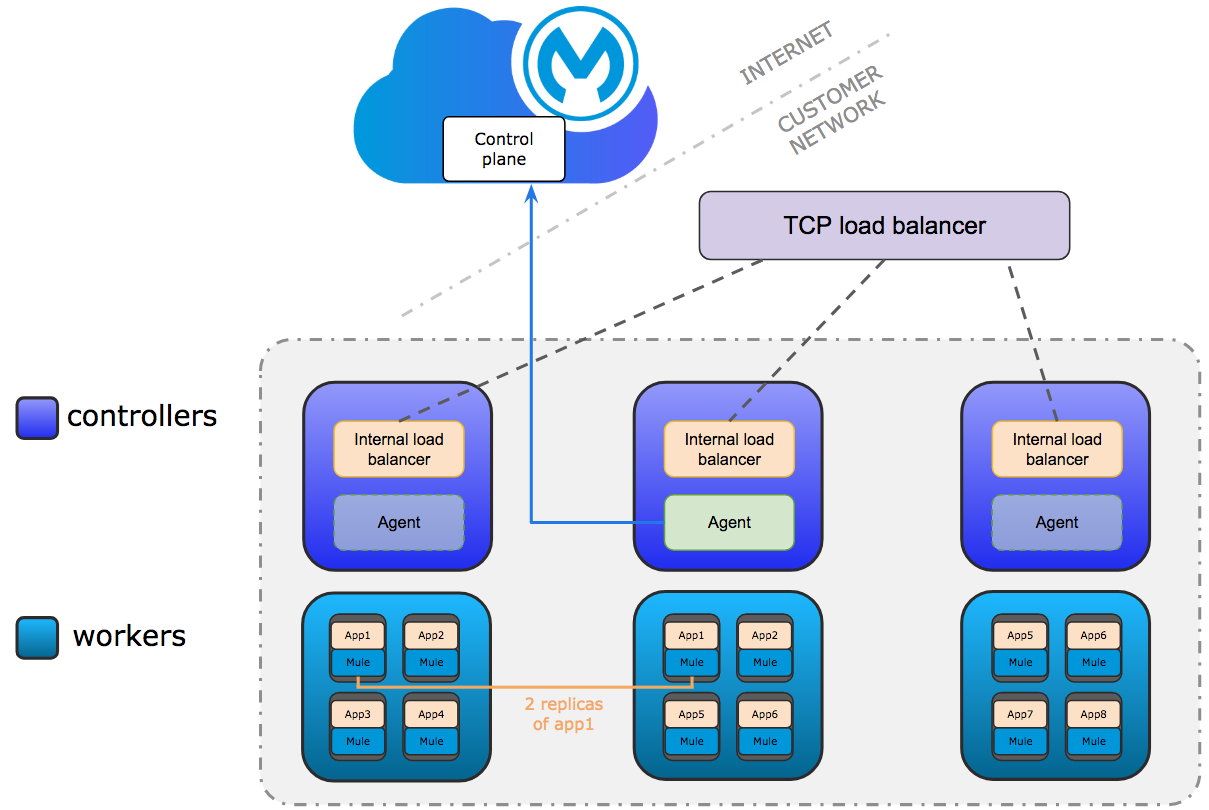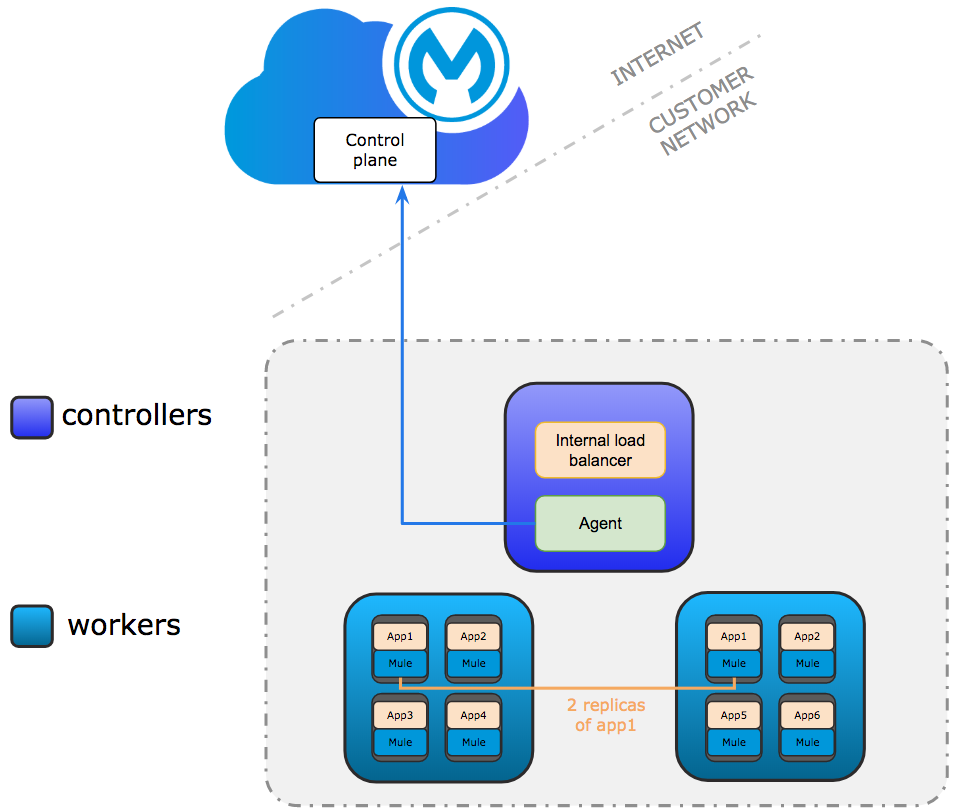
System Requirements for Anypoint Runtime Fabric
Anypoint Runtime Fabric supports development and production configurations. The requirements for each configuration are described below. See Runtime Fabric Architecture for a description of these environments.
| Review these requirements with your operations and IT teams to ensure you have the right infrastructure provisioned before installing Runtime Fabric. |
Operating System Requirements
Anypoint Runtime Fabric requires one of the following operating systems.
-
Red Hat (RHEL) v7.4, v7.5, v7.6, v7.7
-
CentOS v7.4, v7.5, v7.6, v7.7
Use the same operating system for each node. If you attempt to install Runtime Fabric on a different operating system version or distribution, the Runtime Fabric installer will fail.
Hardware Requirements
Only x86 and x64 architectures are supported.
Runtime Fabric can reserve up to 0.5 cores per worker node for internal services. This is important when determining the amount of CPU cores and worker nodes needed.
For example, your Runtime Fabric could have three worker nodes and two CPU cores for each worker node. If Runtime Fabric reserves 0.3 cores per worker node, a total of 0.9 cores, the number of available cores displayed in Runtime Manager is 5.1 vCPU instead of 6 vCPU.
Overprovisioning Runtime Fabric worker nodes is recommended to preserve uptime in the event a node becomes unavailable or during maintenance operations such as OS patching.
Production Configuration
A minimum of 6 nodes are required for a production configuration of Runtime Fabric as shown in the following diagram.

| Runtime Fabric does not support running controller or worker nodes using burstable VMs. |
The following sections describe the minimum system requirements of each controller and worker nodes in a production configuration.
Controller Nodes
The number of controller nodes required for a production environment is three. Even numbers of controller nodes are not supported. These requirements reflect the minimum requirements to maintain high-availability and ensure system performance.
Each controller node must have the following:
-
A minimum of 2 dedicated cores.
-
8 GiB memory minimum.
-
80 GiB dedicated disk for the operating system.
-
20 GiB or more for
/tmpdirectory. -
8 GiB or more for
/opt/anypoint/runtimefabricdirectory. -
1 GiB or more for
/var/log/directory.
-
-
60 GiB dedicated disk with 3000 provisioned IOPS for etcd. This translates to a minimum of 12 Megabytes per second. (MBps) disk read/write performance.
-
250 GiB dedicated disk with 1000 provisioned IOPS for Docker. This translates to a minimum of 4 MBps disk read/write performance.
| Dedicated disks are required to ensure optimum performance. The Runtime Fabric installer formats and mounts the disks needed during installation. |
Worker Nodes
Runtime Fabric requires at least three worker nodes to run Mule applications and API gateways. The maximum number of worker nodes supported is 16.
Each worker node must have the following:
-
A minimum of 2 dedicated cores.
-
15 GiB memory minimum.
-
80 GiB dedicated disk for the operating system.
-
20 GiB or more for
/tmpdirectory. -
8 GiB or more for
/opt/anypoint/runtimefabricdirectory. -
1 GiB or more for
/var/log/directory.
-
-
250 GiB dedicated disk with 1000 provisioned IOPS for Docker. This translates to a minimum of 4 MBps disk read/write performance.
Having 250 GiB ensures there is enough space to run applications, cache docker images, provide temporary storage for running applications, and provide log storage.
| Dedicated disks are required to ensure optimum performance. The Runtime Fabric installer formats and mounts the disks needed during installation. |
Additional Resource Requirements for Production Environments
When using Runtime Fabric in a production environment, you must have the following components:
-
An external load balancer if incoming traffic is enabled to Runtime Fabric. A TCP load balancer with a server pool consisting of each of the controller nodes is sufficient.
-
At least one additional worker node, including hard disks. If preserving uptime for the cluster and applications is necessary, you will need additional resources when updating the operating system or other packages that require restarts. Also use the additional node when:
-
Performing rolling upgrades to major versions of Runtime Fabric
-
Performing operating system level patches.
-
Development Configuration
Runtime Fabric requires a minimum of three nodes in a development environment as shown in the following diagram:

| Runtime Fabric does not support running controller or worker nodes using burstable VMs. |
The following sections describe the minimum system requirements of each controller and worker nodes in a development configuration.
Controller Nodes
The number of controller nodes required for a development environment is one. Even numbers of controllers are not supported.
Each controller node must have the following:
-
A minimum of 2 dedicated cores.
-
8 GiB memory minimum.
-
80 GiB dedicated disk for the operating system.
-
20 GiB or more for
/tmpdirectory. -
8 GiB or more for
/opt/anypoint/runtimefabricdirectory. -
1 GiB or more for
/var/log/directory.
-
-
60 GiB dedicated disk with 3000 provisioned IOPS for etcd. This translates to a minimum of 12 Megabytes per second (MBps) disk read/write performance.
-
100 GiB dedicated disk with 1000 provisioned IOPS for Docker. This translates to a minimum of 4 MBps disk read/write performance.
| Dedicated disks are required to ensure optimum performance. The Runtime Fabric installer formats and mounts the disks needed during installation. |
Worker Nodes
Runtime Fabric requires at least two worker nodes to run Mule applications and API gateways. The maximum number of workers nodes supported is 16.
Each worker node must have the following:
-
A minimum of 2 dedicated cores.
-
15 GiB memory minimum.
-
80 GiB dedicated disk for the operating system.
-
20 GiB or more for
/tmpdirectory. -
8 GiB or more for
/opt/anypoint/runtimefabricdirectory. -
1 GiB or more for
/var/log/directory.
-
-
100 GiB dedicated disk with 1000 provisioned IOPS for Docker. This translates to a minimum of 4 MBps disk read/write performance.
| Dedicated disks are required to ensure optimum performance. The Runtime Fabric installer formats and mounts the disks needed during installation. |
Additional Resource Requirements for Development Environments
To keep your Runtime Fabric running during upgrades, at least one additional worker node is required, including hard disks. This node should only be used when:
-
Performing rolling upgrades to major versions of Runtime Fabric
-
Performing operating system level patches.



